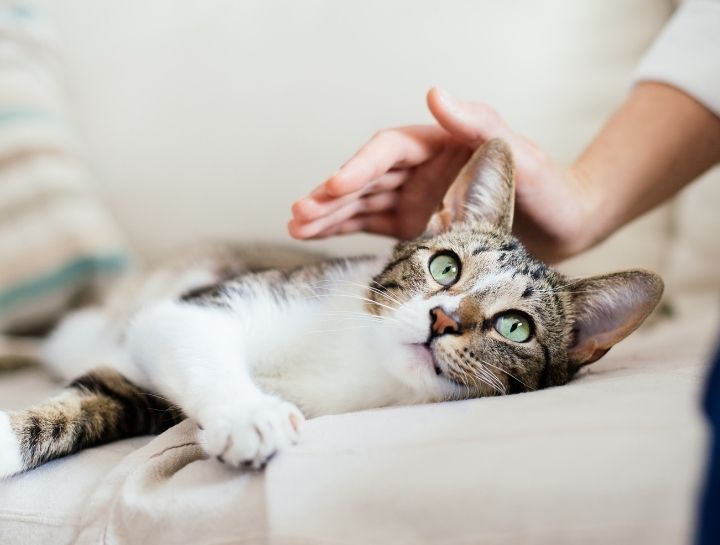Preventive Care for Cats
Help your cat live a longer, happier life.
Preventive care is an essential part of keeping your cat happy and healthy. It will give you peace of mind and increase the odds of detecting underlying health conditions before they become advanced and expensive.
Physical exams are just as important for your pet as they are for you and me. They are probably even more important because your dog or cat can't tell you when they need to go to the doctor! There may be signs from your pet that they are sick, such as laziness, lack of appetite, and change in demeanor, among others. If you notice these symptoms you should schedule an appointment with your vet. Even if your pet seems to be perfectly healthy, you should bring them in for a physical exam at least once a year, and more often if they are older. Your pet's exam will be very similar to a physical you would have, including checking the ears, eyes, mouth, internal organs, and skin and coat.
At your cat's annual exam, your veterinarian will answer any questions you may have and discuss other services that could improve their overall health such as spaying/neutering, microchipping, and dental care.
Feline Vaccines
All cats should be vaccinated to protect against harmful and potentially life-threatening diseases. The types of vaccines your cat should be given will vary based on the lifestyle of your cat. If your cat lives in the house and does not come into contact with other cats, only the basic vaccines are necessary. If your cat spends time outside and around other cats, the proper precautions should be taken with the necessary vaccinations.
Rabies
Rabies is a disease nearly everyone has heard of. It is contracted when an animal is bitten by another animal that has been infected. The disease is carried in the saliva. Rabies vaccinations are required in many states for cats. Even if you have an indoor cat, they should be vaccinated in case they get out, or by chance an animal were to get into your house. In nearly all cases, an animal will need to be put down if it has been infected with rabies.
FVRCP
This vaccine, also known as the "feline distemper vaccine", is one of the core vaccines all cats should get regardless of being indoor or outdoor. Vaccinations typically start at around 8 weeks of age and consist of a series of about 2-3 follow-ups about 3 weeks apart. Your cat should also receive a vaccination every 1-3 years going forward. It protects your cat against the 3 following diseases:
- Rhinotracheitis
Caused by the herpes virus, Rhinotracheitis is an upper respiratory infection that is highly contagious. The infection could prove to be fatal in young kittens, so the vaccination is highly recommended. The vaccine lasts for about 3 years, so follow-up vaccinations are necessary. - Calicivirus
Calicivirus is a virus that causes an upper respiratory infection. It is very contagious through contact with infected cats. Symptoms include fever, gum disease, mouth ulcers, sneezing, among others. More advanced forms of the virus are more severe and can cause fatality. Cats do not need to exhibit symptoms in order to transmit the disease to other cats. The contagious nature of this disease makes it important for your cat to receive a vaccination. - Panleukopenia Virus
The more common name for this virus is “distemper”. It is a highly contagious disease which is why vaccination is recommended. Symptoms include fever, seizures, loss of appetite, and possibly death. Kittens are born with a natural immunity for the first few weeks of their lives.
Feline Leukemia Virus
This is another virus that is spread through direct contact with an infected cat. For this reason, the vaccine is highly recommended for outdoor cats, or cats that are frequently in contact with other cats. Indoor, solitary cats should still be vaccinated to prevent the potentially fatal virus, but are not at as high a risk to contract it. Like all vaccines, there are some potential side effects. A small percentage of cats developed cancerous sarcomas when they were injected with the vaccine. Have a conversation with your vet if you have any questions about the vaccine.
Feline Infectious Peritonitis
This is a disease that has no cure and is fatal in most instances. The good news is that for households with only 1 or 2 cats only 1 in 5000 cats are affected. The vaccine for this disease has not proven to be very effective to this point, so most cats will not require this vaccination.
Chlamydiosis
This disease is much more prevalent in cats that live in a multiple-cat environment. The most obvious symptom is usually conjunctivitis, and the disease is carried in the eye discharge of infected cats. Adverse reactions to the chlamydiosis vaccine occur at a higher rate than most vaccines, so if you have an indoor cat it is usually not recommended. Speak with your vet if you have any questions about this vaccine.
Call us at (603) 253-7701 or request an appointment online to schedule your cat's annual preventive care exam.

